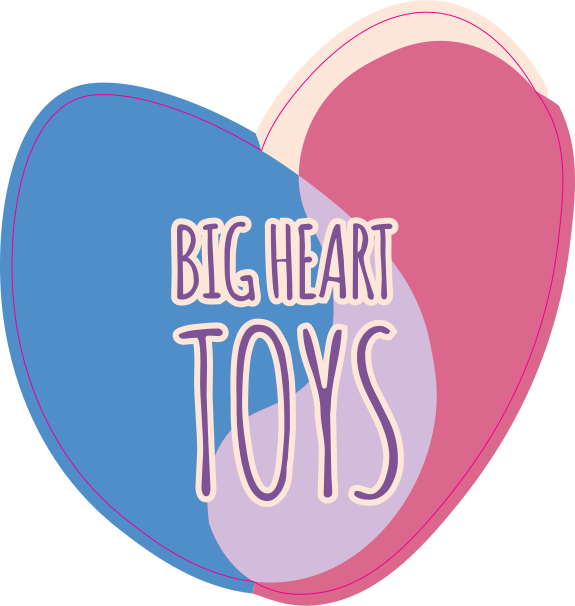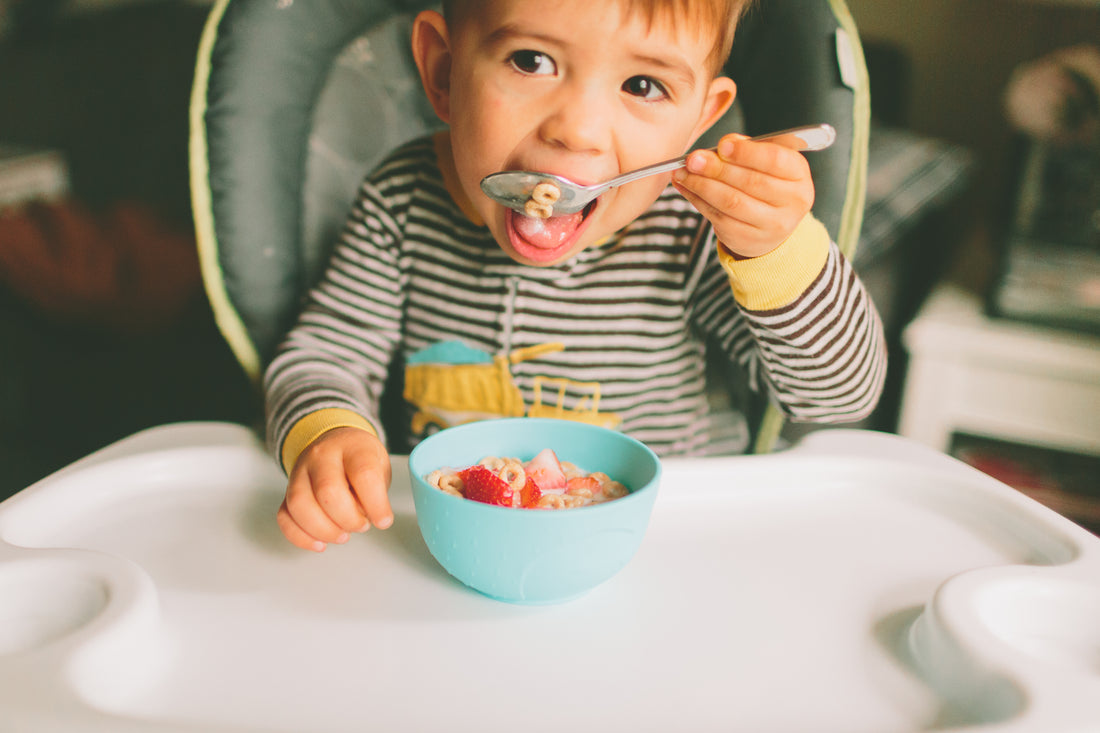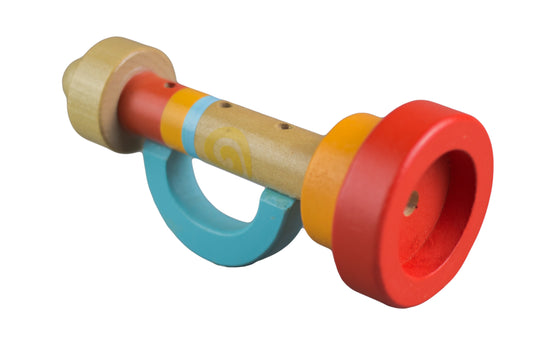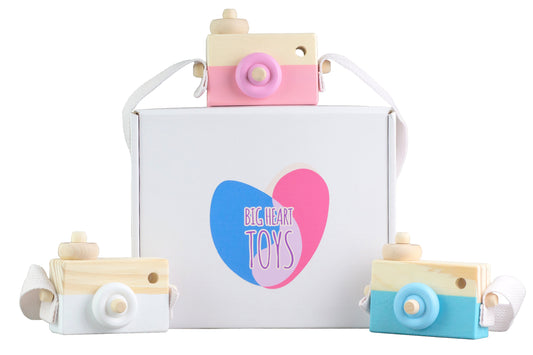It’s no secret that toddlers can be extremely picky, especially when it comes to food. Introducing a healthy, well-balanced diet from a young age can have a lasting impact and teach your children to make good food choices.
When you’re in the trenches of parenthood, it’s easy to fall into a groove and find a few quick, easy meals to make a staple in your household. If you’re getting tired of the same old things, come explore some easy, healthy, and tasty breakfast options with us!
Is Breakfast Really the Most Important Meal of the Day?
The widely popular idea that breakfast is the most important meal of the day is based on several reasons. Breakfast provides the body and brain with fuel after an overnight fasting period and helps to kickstart metabolism. It can enhance cognitive function and concentration, specifically in children.
Eating a nutritious breakfast has been associated with improved overall nutrient intake, weight management, and reduced risk of illness. Of course, individual needs may vary. It’s important to be in tune with your child’s body and find an eating pattern that works best for you.
For instance, many toddlers and children may not like to eat first thing in the morning. That’s okay, don’t force it. There’s no harm in having a later breakfast once you’re more awake if your schedule allows for this flexibility.
How To Foster a Healthy Relationship Around Food

Creating a healthy relationship around food requires a positive and balanced approach. First, understand that you are your child’s role model when it comes to feelings about food and food choice. Demonstrate healthy eating habits and the power of balance.
Introducing a variety of choices and the concept of moderation can be helpful, too. Encourage a diverse range of nutritious food, emphasizing balance and moderation over strict rules and limits. As with almost anything, making a food “off limits” to a toddler (with the exception of allergies and extreme circumstances) will make that food seem more intriguing and make them want it more.
Model Healthy Behavior
Rather than telling them no to their favorite yummy treats, model when it’s an appropriate time to have a treat and how to have a healthy meal beforehand. Because modeling behavior is so important here, it’s crucial to plan for family meals as often as possible. Providing opportunities for connection and shared experiences around food is more impactful than you may think.
Use positive language and avoid food pressure. Pressuring one food can make it seem intimidating and forced. Instead, allowing them to pick between a few healthy options is a more natural and encouraging approach.
Make food a family thing. Involve your children in meal planning, grocery shopping, cooking safely, and food preparation. This teaches them to appreciate food and provides a wonderful bonding time.
Consider Sensory Inclinations
It’s not uncommon for little ones, especially neurodiverse children, to have extreme food pickiness. This can be sensory-related, preferring or avoiding food with specific textures, or routine related, wanting the same food they enjoy and avoiding having to try new things. These are common occurrences in children with autism, but anyone can experience these.
There are also medical-related reasons for selective eating that should be ruled out by a pediatrician. Understanding the why behind your child’s specific preferences is important to overcome it.
Set Small Goals
This challenge can’t typically be tackled all at once — go in baby steps. Set small goals and stick to working on them one at a time. Choose a few important things you’d like your child to work on and prioritize them to work on one at a time.
Small goals, such as sitting at the table for longer periods of time, taking a single bite of a new food, or eating a certain amount of the food on their plate, are more manageable to handle and should be praised and celebrated.
Toddler Food FAQs
Should I Ask My Toddler What They Want To Eat?
There is something to be said about the power of choice. Allowing toddlers to build their own opinions and make choices is a critical part of developing their own independence. Being part of the decision-making process promotes a toddler's sense of autonomy, encourages healthy decision-making, and reduces the likelihood of food defiance.
However, asking a toddler in an open-ended way, like simply asking, “What do you want to eat?” can set you up for failure if they answer “candy” or “ice cream” and are now dead-set on that option. (Although teaching children to handle “no” is essential.)
Instead, invite them to be part of the decision-making process by offering two or three acceptable choices and letting them choose from options you’ve already predetermined. This balance works with a variety of things, especially selecting meals.
Decide on a few things you are willing and able to make that morning. You have the power to provide healthy options, so there is no wrong answer. Then, allow your little one to choose what they are in the mood for. This allows them to feel respected — and makes it more likely that they will eat their breakfast.
How Much Food Should Toddlers Eat?
The amount of food a toddler needs varies based on age, weight, appetite, and individual needs. In general, most toddler menus will consist of three meals and two/three healthy snacks per day. Meals should include a variety of food groups, including grains, fruits, vegetables, protein, and dairy.
Snacks are meant to bridge the gap between meals and maintain energy levels. Snacks should provide nutrient value and variety in food groups. Some examples include yogurt, fresh fruit, whole grain crackers, veggie sticks and dip, or peanut butter or almond butter on whole wheat bread.
Be flexible and adapt to your child’s appetite. Some days they may be less interested in their meals and require an additional snack or two. This is completely normal and developmentally appropriate for toddlers.
How To Factor Weaning into Meal Plans
When factoring weaning into meal plans for toddlers, it’s important to consider their developmental readiness for foods. Start with a gradual introduction, letting them try one solid at a time. Many parents choose to start with purees or mashed foods, while others choose to begin with baby-led weaning. Whichever route you take, start slow and cautiously, offering a variety of textures and flavors to widen your baby’s palate.
Vary food groups and gradually increase portion size as you decrease breastmilk or formula intake slowly. When just beginning solid foods, breastmilk or formula will still be a large portion of your child’s nutrition, but as they eat more and get nutrients from other foods, you can decrease the amount of milk being offered.
Start offering water with meals to let your child practice drinking from a cup and let them start getting used to liquids other than formula or breastmilk. Weaning is a gradual process, and each child goes at their own pace. It can take time, but going into the process with patience and flexibility will help set your expectations.
9 Easy Breakfast Recipes for Toddlers
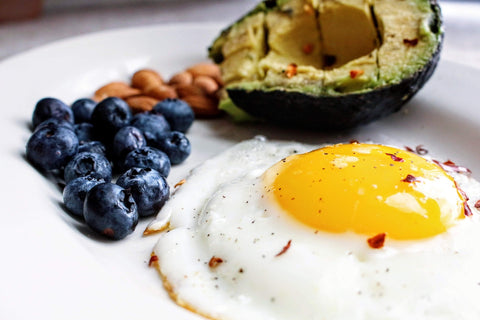
An optimal health meal will combine several key groups, including protein, calcium, complex/simple carbohydrates, and healthy fats.
Here are nine divine options that will have your family sending their compliments to the chef.
1. Smoothies
Smoothies are a mouth-watering way to hydrate and pack in nutrients. To make a toddler-friendly smoothie, blend together a ripe banana, some berries, a splash of milk or yogurt, and a spoonful of nut butter.
Smoothies provide a variety of food groups, vitamins, minerals, and fiber to support growth and development. They are also refreshing and taste like a yummy treat, so your toddler will be happy to try them!
2. Applesauce Overnight Oats
Overnight oats are both convenient and nutritious. In a jar or container, mix rolled oats with unsweetened applesauce, a splash of milk, and a sprinkle of cinnamon. This is great for meal prep, as it then sits overnight in the fridge.
In the morning, you’ll have a creamy and flavorful oatmeal ready to serve. Toddlers will love the natural sweetness of the applesauce while benefiting from the fiber and complex carbohydrates in each oat. This will sustain their energy throughout the morning until their next snack or meal.
3. Breakfast Quesadilla
A breakfast quesadilla is a fun and versatile option for toddlers. Fill a whole wheat tortilla with scrambled eggs, diced vegetables like tomatoes or peppers, and sprinkle some cheese on top. Cook it on a skillet until the cheese melts and the tortilla turns a golden brown.
Cut into kid-friendly triangles or appropriate finger sizes for your toddler’s age, and watch your little one enjoy this protein-rich and customizable breakfast. This is an excellent choice as it’s easy to add or remove ingredients to your child’s preference, and the crunchy texture is often a family favorite.
4. Avocado Toast
Avocado toast is a trendy and nutritious breakfast for your toddler to enjoy. Toast a slice of whole grain bread and spread mashed avocado on top. This one is quick to make and customizable by adding a sprinkle of cheese, egg on top, cherry tomatoes with avocado, and a variety of other options to make this more enticing and delicious for your child.
Avocado provides healthy fats, while whole-grain bread offers fiber and energy-sustaining nutrients for your toddler’s busy day. The mixed textures can broaden your baby’s palate and expose them to new foods.
5. Egg Muffins
Egg muffins are an easy, portable toddler breakfast option that can be prepared up to days ahead of time and enjoyed reheated. These are great on-the-go breakfasts for busy mornings. In a muffin tin, whisk together eggs and a variety of chopped veggies or cheese.
Bake in the oven until the eggs are set, and the muffins are slightly golden. You can make these in a regular or mini muffin tin, but either way, these are perfect for little hands and packed full of protein and essential nutrients.
6. Whole-Grain Waffles
Homemade whole-grain waffles are delicious and a popular baby choice. Combine whole wheat flour, baking powder, milk, eggs, and a touch of sweetness with honey (if over one-year-old) or mashed bananas. Cook the batter in a waffle iron until golden and crisp.
Serve these waffles with a bit of yogurt and a mini bowl of fresh fruit for the perfect relaxed weekend breakfast. You might even add a couple of chocolate chips on top for a sweet flavor. Toddlers will eat up the crispy-but-fluffy texture and sweet taste while benefiting from the fiber and nutrients in the whole grain: A top-tier example of balancing foods.
7. Whole Wheat Mini Banana Pancakes
Mini banana pancakes are a healthy twist to a classic toddler favorite breakfast. Mash a ripe banana and mix it with whole wheat flour, milk, and a beaten egg. Cook small portions to make these miniatures on a griddle or skillet.
These are easy to handle and provide natural sweetness, fiber, and complex carbohydrates. Babies love store-bought pancakes, and making them this way can model how to make yummy food in healthier ways to enjoy and feel good about.
8. Zucchini Oatmeal Breakfast Cookies
Cookies for breakfast? Who would turn that down? Zucchini oatmeal breakfast cookies are both nutritious and fun. Combine grated zucchini, rolled oats, mashed banana, a touch of honey or maple syrup, and a sprinkle of cinnamon.
Mix well and shape the mixture into small cookies. Bake until they’re golden and firm. Zucchini is uniquely able to morph into foods creating a healthier option while hardly being detectable. These cookies are loaded with fiber, vitamins, and minerals, making them a wholesome and tasty breakfast treat for toddlers.
9. Scrambled Eggs on a Whole-Grain Bagel
This makes for a satisfying and protein-rich breakfast. Scramble eggs with a splash of milk and cook them in a non-stick pan until fluffy. Toast a whole-grain bagel and spread a small layer of cream cheese. Top it with scrambled eggs, and add some sliced tomato, avocado, or cottage cheese to taste for added flavor and nutrients.
The combination of whole grains, protein, and added fats in this breakfast option will keep your toddler energized and satisfied.
Food for Thought: Healthy Breakfasts
These nine easy meal ideas for toddlers provide a range of nutrients, flavors, and textures to support growth and development. From smoothies packed with fruits and veggies to portable egg muffins and wholesome whole-grain options, these recipes are designed to please even the pickiest eaters.
By offering a variety of nutritious breakfasts, you can help your toddler establish healthy eating habits and set them up for a great start to their day.
For more information on all things raising happy, healthy children, check out Big Heart Toy’s article resource center!
Sources:
Fussy Eating: Autistic Children and Teenagers | Raising Children Network
Autism and Picky Eating | Child Mind Institute
Toddler Food and Feeding | AAP
Foods to avoid giving babies and young children | NHS
Is breakfast really the most important meal of the day? | Cleveland Clinic
